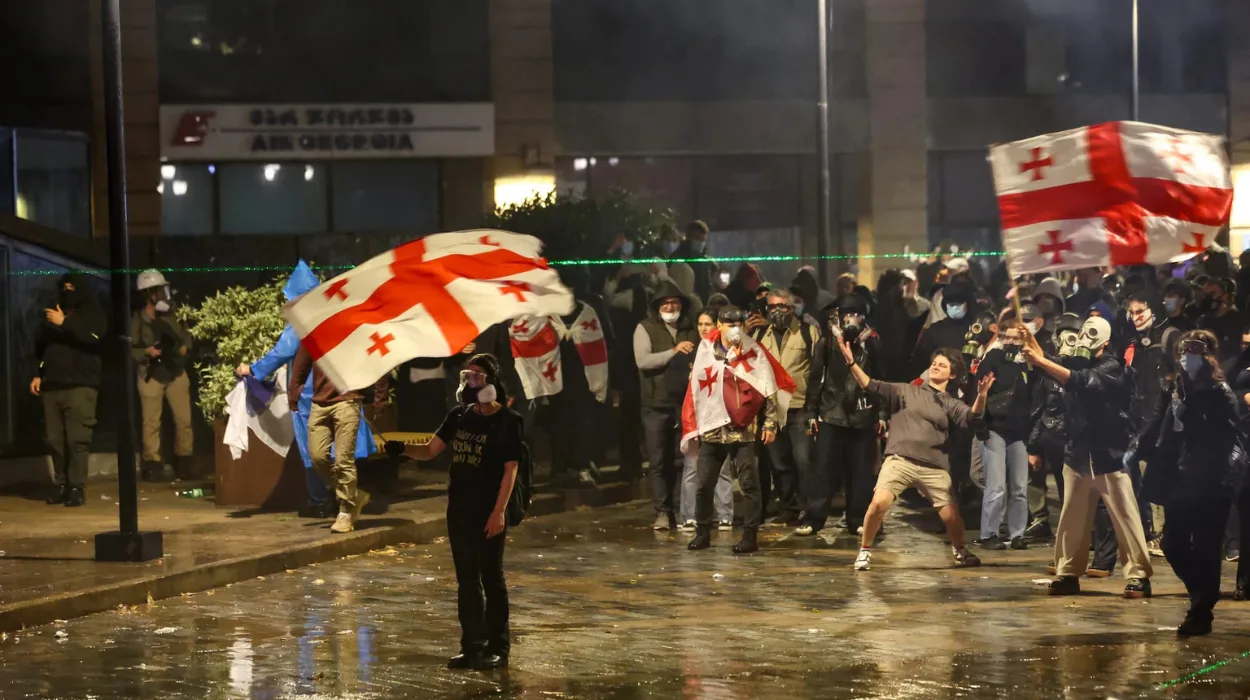Moscow (Parliament Politics Magazine) – Russia claims the EU tried a coup in Georgia as protesters clashed with police during local elections in Tbilisi, leaving several injured.
As reported by The Telegraph, Russia accuses Brussels of attempting to stage a coup in Georgia.
Protesters on Saturday, 4 October, in Tbilisi attempted to breach the presidential palace, but police used tear gas, pepper spray, and water cannons to repel them. The clashes left 21 security officers and six protesters injured.
Russian politician’s views on the EU’s role in Georgia
Viktor Voldatsky, a senior Russian politician, said Georgia is “under attack” by Brussels and Western NGOs, accusing them of engaging in “special activities aimed at starting a civil war in Georgia.”
Leonid Slutsky, head of the Duma’s international affairs committee, accused the West of trying to replicate Ukraine’s 2014 Maidan Revolution in Georgia.
He said,
“Just like more than ten years ago in Ukraine: riots again, storming of government residences again, bonfires again.”
The remarks aligned with Georgian Prime Minister Irakli Kobakhidze’s statements. On Sunday, he claimed Brussels supported an attempt to “overthrow the constitutional order” and pledged to “completely neutralise foreign agents.”
How did authorities claim protesters planned to overthrow the state?
The ruling Georgian Dream party has been accused of exploiting public fears, alleging that a pro-Western “Global War Party” seeks to trigger unrest and escalate the Russia-Ukraine conflict in Georgia.
Since the 2008 invasion, Russian troops have remained in Georgia, maintaining de facto control over approximately 20% of its territory.
Georgia’s SSG claimed protesters had stockpiled explosives and firearms to overthrow the state, as authorities announced plans to tighten control over nightly demonstrations.
Five members of the opposition were charged with attempting to overthrow the government.
The October 4 protest was billed as a “peaceful revolution” to challenge Georgian Dream, following over 300 days of demonstrations that repeatedly paralyzed central Tbilisi.
The protests are still going on despite arrests, police attacks, and restrictions on rights groups, media, and opposition. But fewer people have been joining in recent months.
Mikheil Saakashvili’s views on the Georgia protests
Jailed reformist ex-leader Mikheil Saakashvili urged demonstrators to take to the streets, warning it was Georgia’s “last chance” to protect democracy.
Georgian Dream won a landslide across municipalities after opposition blocs boycotted and accused the ruling party of pro-Russia leanings.
Over the summer, eight opposition leaders were jailed after refusing to cooperate with a parliamentary inquiry, with two more later arrested on different grounds.
Kaja Kallas, the EU’s lead diplomat, and Commissioner Marta Kos said the bloc strongly rejects reports suggesting EU interference in Georgia.
Which Georgian opposition leaders wrote to the UK?
Imprisoned Georgian politicians have warned the UK foreign secretary, Yvette Cooper, of increasing ties between Georgian Dream and Iran.
From prisons in Rustavi, seven Georgian opposition figures have written warning of an “unprecedented expansion” of Iranian influence.
Writing to Ms Cooper, the jailed politicians said,
“We … respectfully urge you to consider extending sanctions to these individuals, their entities, and their family members, to ensure they can no longer enjoy the benefits of the UK’s democratic society while working to erode it.”
The politicians write,
“Over recent years, Georgian Dream and its patron, oligarch Bidzina Ivanishvili, have consolidated control over all state institutions, achieving full state capture and steadily dismantling the democratic constitutional order.”
How the UK targets Georgia-linked pro-Russia figures?
The UK imposes sanctions on Georgian judges and politicians, targeting those linked to supporters of Russian President Vladimir Putin’s war in Ukraine.
Britain targets Levan Vasadze for using his media platforms to spread pro-Russian disinformation.
Referring to this the jailed leader said,
“The United Kingdom has already shown leadership by sanctioning members of Georgian Dream’s repressive apparatus – measures that had real impact and were deeply appreciated by our people.”
They added,
“Yet we are concerned that key enablers of Georgian Dream – including business allies, family members of Mr Ivanishvili, and owners of propaganda outlets that, according to credible reports, spread Russian-scripted disinformation even targeting the UK – still continue to benefit from the UK’s financial system, with some operations reportedly based in London.”
Key facts about the Ukraine-Russia war
The conflict began in February 2014 with Russia annexing Crimea and fighting in Donbas, escalating to a full-scale invasion on February 24, 2022. Russia has suffered around 950,000 military casualties, with deaths near 250,000.
Ukraine has sustained nearly 400,000 military casualties, including an estimated 60,000 to 100,000 deaths. Both sides have faced severe losses since the conflict began.


